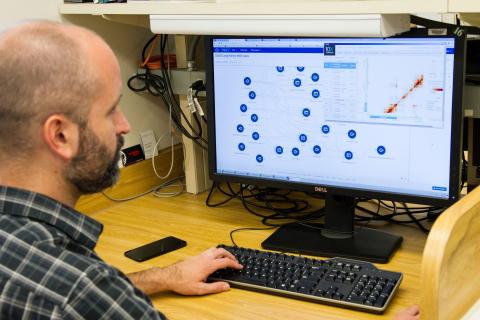What You Can Do with an Informatics Degree
Business runs on technology driven by data. Skilled informatics professionals are in demand to manage the systems that collect, analyze, and use data to guide business decisions.
Regardless of your background, if you’re looking to apply your expertise in new and exciting ways, informatics could be a perfect fit.
What is Informatics?
Informatics is the bridge between technology and business.
As an informatics student, you’ll learn to use cutting-edge technologies and develop management skills for high-paying jobs in any industry. 
"Informatics is an area of computing that focuses on human needs by way of technology applications,” says Dr. Michael Totaro, Informatics Program Coordinator. “If you're interested in technology, computing, data, and how those come together for specific purposes, informatics is worth looking at.”
Dr. Totaro is a professor in the School of Computing and Informatics, and program coordinator for the M.S. in Informatics degree program.
What Can I Do with an Informatics Degree?
For those with an unrelated degree, UL Lafayette’s master’s in informatics is your key to unlocking new doors in data science.
“Students can merge the area of expertise they already have with the expertise they will develop in informatics,” says Dr. Totaro.
“Because informatics is so cross disciplinary, that's actually a good situation to be in. Everything that you've learned, everything that you've done, can be useful to you.”
The Master of Science in Informatics is designed to build on any bachelor’s degree. You can take courses based on your interests in business, media technology, systems administration, web development, and network security.
You’ll be prepared for data science roles in any industry. You can apply your skills in application development, business process analysis, database or network security administration, and more.
Who’s Hiring Informatics Professionals?
The short answer? Everyone.
Informatics, computing and data science are among the fastest growing professions in the country, with openings in every industry.

M.S. in Informatics alumni Jason Suire completed his bachelor’s in English before turning to tech.
Now, as a cybersecurity architect for consulting firm CGI, he appreciates how informatics applies to a range of fields.
“Even if you go into, say, political science, the statistical and procedural background is extraordinarily helpful in setting up strategies,” he says.
“Operational sciences and research are good in any practice because it helps you break down the inner workings of a business.”
Career Opportunities in Informatics: 
- Application development. Translate software requirements into workable programming code and maintain and develop programs for use in business.
- Business intelligence architecture. Build standards to define and govern the creation, enhancement, and evolution of the IT system landscape.
- Business process analysis. Provide business process support including root cause analysis, mapping current systems, and hypothesized improvement opportunities.
- Database development and admin. Plan and manage the performance, integrity and security of a database as well as troubleshoot any issues on behalf of the users.
- IT support. Provide troubleshooting, software maintenance, testing, network execution, load balancing and scalability, vendor management, and more.
- IT business management. Become a link between a firm’s information technology capabilities and its business objectives.
- IT project management. Plan, budget, oversee and document all aspects of unit projects while ensuring the scope and direction of each project is on schedule.
- Network security admin. Inform users about computer security, check for security violations, install protective software and act against cyber-attacks.
- Web development. Create the look, layout and features of a website.
Unlock jobs in informatics through the M.S. in Informatics online or on-campus. Request more information today.
